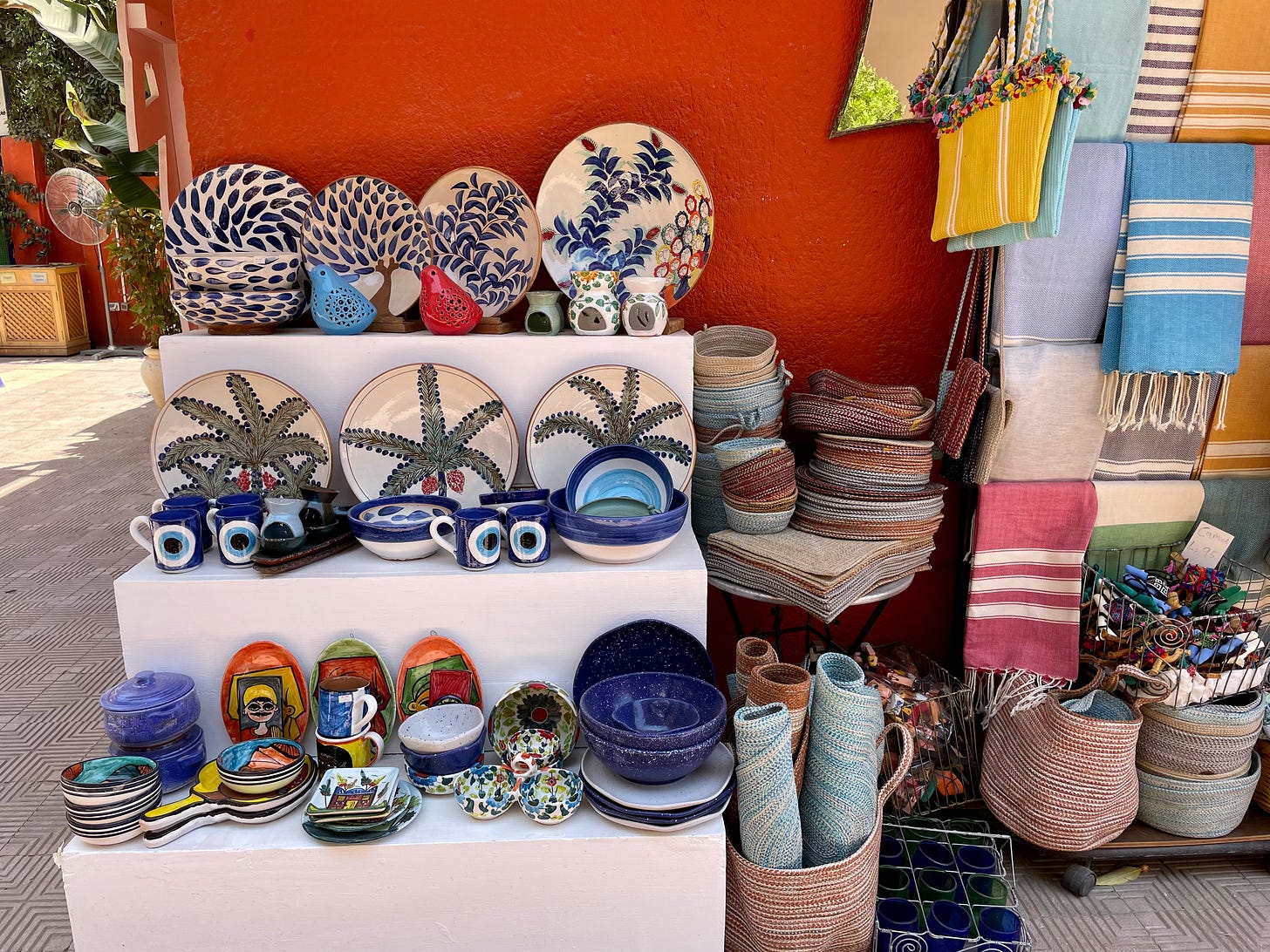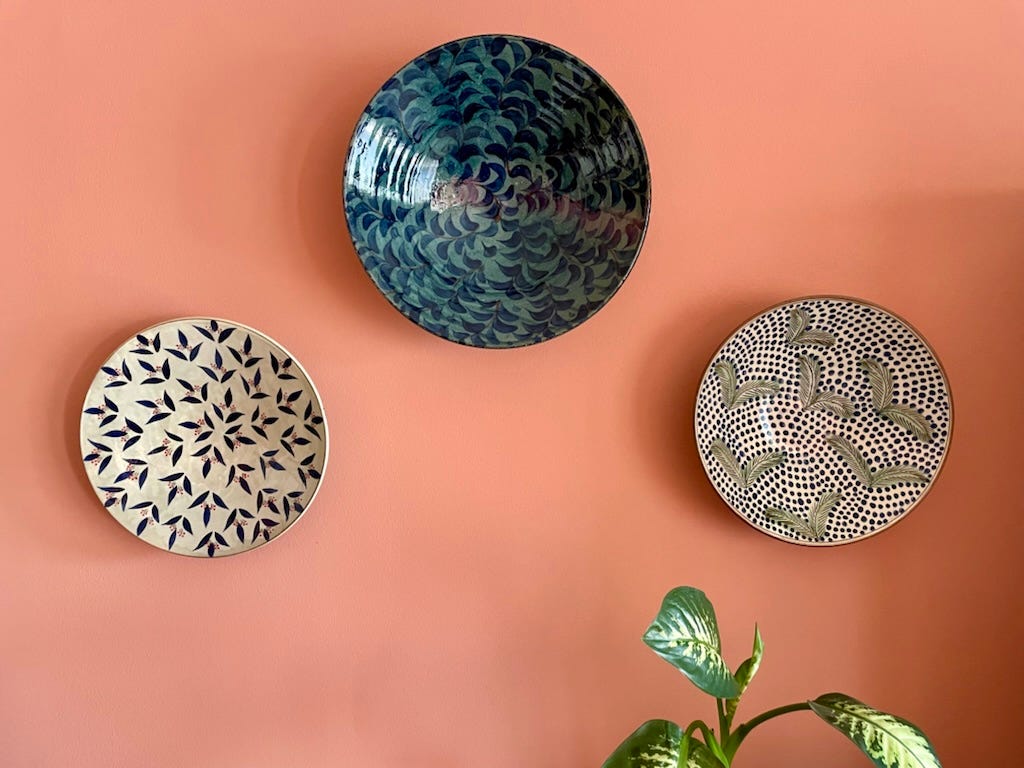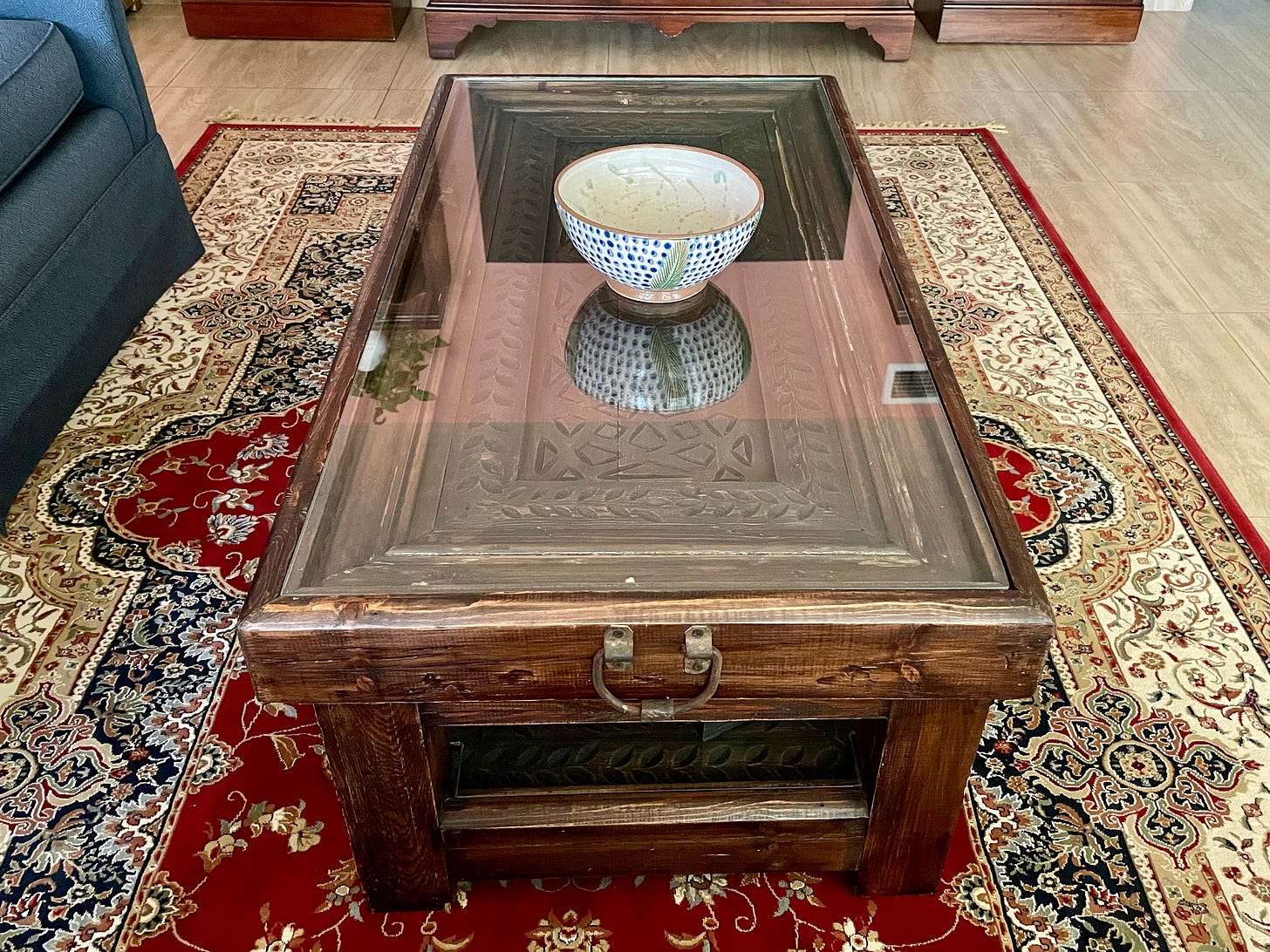Cairo is what State Department types refer to as a “shopping post,” i.e. a relatively cheap country with artisan goods worth scooping up by the handful. Pottery, blown glass, kilim rugs, reed baskets. It’s like an endless Anthropologie sale section. A cornucopia of delicious handicrafts, like so:
This is fortuitous, because my favorite hobby just happens to be buying things I don’t need. Since we’ve gotten to post, I’ve been on an uninterrupted shopping rampage.
I am far from the only expat who does this—Westerners in Cairo tend to buy a lot while they’re here. So when Egyptians notice me, a white lady, coming up the street, they see dollar signs. Local sellers assume not only that I have money to spend, but that I want to spend it. They are not wrong. I might nip down to the shops on any given day, and my internal monologue might sound something like this:
Alabaster lanterns? Those will make nice replacements for the weird pineapple lamps the State Department put on our bedside tables. Miniature bentwood chairs to sit on my bookshelves? Thank you, I’ll take three. Hand-thrown vases that look straight out of a Crate & Barrel catalogue, but cost $6? Sold, to the blonde in the flowy linen pants! A mini shisha (which is a cruel tease because it doesn’t actually work)? That will look INCREDIBLE next to my tiny bentwood chairs. I’ll have an entire miniature café in my living room.
My binge feels mostly justified, because our apartment has 4 more rooms than our place in D.C. did, and those rooms need filled. Also because I need to distract from the sad, knockoff Queen Anne furniture the Embassy issued us. (The Department’s baffling décor choices are a rant for another day, but you can read this if you’re morbidly curious.) Plus, global handicrafts are my weakness, and they’re the sorts of things that will one day prove I’m cool and interesting. (Right?) Years from now, someone will walk into my house and ask where I got the amazing ceramics hanging on my wall. I’ll casually answer, “oh, I picked them up from a pottery studio near Fayoum oasis,” and they’ll know that I’ve really lived. (Right??)
You might be wondering if my wild spending is truly feasible, and if I’ve done the math on it. I have. The weakness of the Egyptian pound is a terrible enabler—it’s basically Monopoly money. The pound (EGP) has lost 16% of its value against the dollar since we arrived in November. It now sits at 0.053 EGP = 1 USD, allowing me to consume with abandon. Most of the things I buy are in the 100-250 pound range, which translates to about $5-$13. Our groceries cost around $20 per week, restaurant meals are rarely over $30 between Nick and I, and a tank of gas is about $25. That leaves us with a lot more disposable income than we had in D.C.
Still, I often wonder if I’m overindulging. Something about buying so much stuff feels…kinda gross, especially when many of the people around me have so little.
To put this in perspective, Egypt’s minimum wage was just raised from 2000 EGP a month to 2400 EGP a month (or about $127), but many workers are employed informally and make nowhere near that. About a third of the country lives on less than $2 a day. Inflation was over 13% in May, and many Egyptians are struggling to buy bread. (Side note: Egypt is the world’s biggest importer of wheat, and war between the world’s two largest producers—Russia and Ukraine—has hit Egypt hard. The government subsidizes bread, but high wheat prices could make that unsustainable. And historically speaking, rising bread prices mean falling governments. Read more here.)
Which brings me a question that’s eaten away at me since my binge began: is it wrong to consume like this when so many around me can barely afford to eat? Am I committing an act of gluttony by gorging myself on useless decorative items?
In the U.S., the conversation around ethical consumption centers around consuming less. This is the root of my shopping-induced guilt. We are taught that everything we buy will eventually end up sitting in a landfill, polluting the earth. Reduce, reuse, recycle, and all that jazz.
That’s a noble pursuit, and in a developed, service-based economy, it makes a lot of sense. Most of the goods available in the U.S. are mass-produced overseas by corporations that put their bottom line first, often at the expense of workers and the environment. If I walked into a Pottery Barn and bought a coffee table, I could be fairly certain that the proceeds wouldn’t go directly to the person who made it, or even the floor manager who helped me. A lot of that money wouldn’t even stay in the local economy. There was likely a complex supply chain (and probably excess carbon emissions produced by that supply chain).
But in Egypt, a relatively large share of the workforce still makes things with their hands, and with local materials—like the coffee table we had custom made out of a salvaged door.
When I reflect on what I’ve actually bought here, it’s almost all been from individual artisans or small businesses, many of whom aim to keep Egyptian craft techniques alive. I can have some confidence that the money I’m spending is going to the producers, and will stay in my community. Even better, it’s all been made of natural materials, like wood, clay, cotton, and wool.
That isn’t to say Egypt doesn’t have plenty of mass-produced, imported crap—on the contrary. The artisans I mention have to struggle against big box stores like IKEA, not to mention the “special Egyptian bazaars” that sell screen-printed “papyrus” and made-in-China tchotchkes.
So if there’s something I want and it’s made by a legitimate Egyptian craftsperson, it seems to me that the ethical thing to do is fork over the money. It helps small businesses compete in a tough economy. It lets my neighbors keep the lights on and buy bread. And it means I get to feel better about my ugly apartment. Win-win-win.
Conclusion: I will continue my shopping spree as usual, and I’ll stop feeling bad about it. And if and when you ever visit me, you can shop guilt-free, too.






Your photos perfectly convey your conundrum because they instantly made me want to shop!
Do you have any recommendations for where to shop when in Cairo or artisans you love?